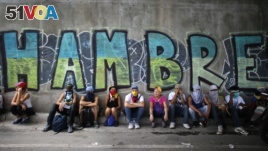Nov 26, 2017
In November, the U.S. Department of the Treasury's Office of Foreign Assets Control designated ten current or former Venezuelan government officials associated with undermining electoral processes, media censorship, or corruption in government-administered food programs. This designation follows the October 15, 2017 regional elections in Venezuela, which were marred by a concerted effort by the National Electoral Council, the CNE, to swing the election in favor of the Maduro regime by disenfranchising hundreds of thousands of Venezuelans.
The newest U.S. sanctions target those responsible for denying their fellow citizens their constitutional right to vote and members of the regime complicit in closing democratic space in Venezuela.

Anti-government demonstrators sit under a bridge that has graffiti written in Spanish that reads "Hunger," during a protest in Caracas, Venezuela, Saturday, July 1, 2017. Demonstrators are taking the the streets after three months of continued protests that has left dozens dead and seen the country's chief prosecutor Luisa Ortega barred from leaving the country and her bank accounts frozen, by the Supreme Court following her mounting criticisms of President Nicolas Maduro. (AP Photo/Ariana Cubillos)
As a result of the U.S. Government's actions, all assets of these individuals subject to U.S. jurisdiction are frozen, and U.S. persons are generally prohibited from dealing with them.
They are Sandra Oblitas Ruzza, the Vice President and a CNE Rector; Socorro Elizabeth Hernandez De Hernandez, a CNE Rector; Carlos Enrique Quintero Cuevas, an Alternate Rector of the CNE; Elvis Eduardo Hidrobo Amoroso, the Second Vice President of Venezuela's illegitimate Constituent Assembly; Julian Isaias Rodriguez Diaz, the Venezuelan Ambassador to Italy; Rodriguez Diaz, who signed the decree requiring the oath of office to be made before the illegitimate Constituent Assembly for governors elected on October 15; Ernesto Emilio Villegas Poljak, Venezuela's Minister of Culture; Jorge Elieser Marquez Monsalve, the Minister of the Office of the Presidency; Manuel Angel Fernandez Melendez, the President of Venezuela's National Telephone Company; Carlos Alberto Osorio Zambrano, President of Venezuela's Superior Organ of the Transport Mission; and Freddy Alirio Bernal Rosales, Venezuela's Minister of Urban Agriculture, responsible for Venezuela's government-run food distribution program.
“As the Venezuelan government continues to disregard the will of its people, our message remains clear: the United States will not stand aside while the Maduro regime continues to destroy democratic order and prosperity in Venezuela," said Secretary of the Treasury Steven Mnuchin. "We will maintain our vigorous efforts to sanction Venezuelan government officials who are complicit in Maduro's attempts to undermine democracy, violate human rights, inhibit the freedom of expression or peaceful assembly, or engage in public corruption, unless they break from Maduro's dictatorial regime."